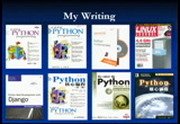Description
Python 3: the next generation is here already
Presented by wesley chun
This talk is about the evolution of Python. We will discuss Python 2 and Python 3: what the compatibility issues are, what the main differences are, and also talk about migration, Python 2.6/2.7, and other transition tools.
Abstract
Python is currently at a crossroads: Python 2 has taken it from a quiet word- of-mouth language to primetime, with many companies around the world using it and an ever-increasing global marketshare of the programming world. But now comes Python 3, the first version of the language that is not backwards compatible with previous releases.
What does this mean? Are all my Python programs going to break? Will I have to rewrite everything? How much time do I have? When is Python 2 going to be EOL'd? Is the language undergoing a complete rewrite and will I even recognize it? What are the changes between Python 2 and 3 anyway? Also, the next generation is already here, as Python 3 is over two years old now. What has been ported so far, and what is its current status? Are migration plans or transition tools available? If I want to start learning Python, should I do Python 2 or Python 3? Are all Python 2 books obsolete?
We will attempt to answer all of these questions and more. Join us!
OUTLINE/TOPICS
- Python 2 vs. Python 3
- Introduction to Python 3
- Backwards Compatibility
- Generational Changes
- Key Differences
- Role of Remaining Python 2.x releases
- Transition & Migration Plans & Tools
- Futures


